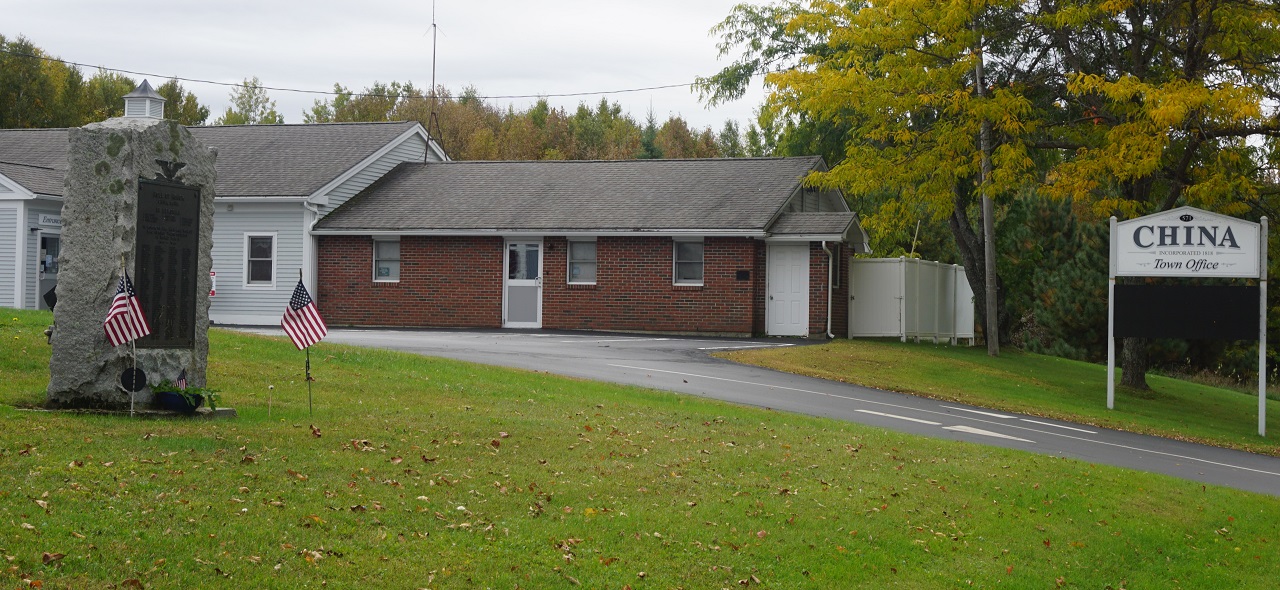CHINA: Eight candidates seek three seats on selectboard; two running for planning board
by Mary Grow
Two dozen China voters took advantage of a chance to meet and question candidates for local office at an Oct. 22 forum sponsored by the China Village Library.
Attending were all eight candidates for three seats on the board of selectmen and one of the two candidates for planning board District 1.
Candidates for two three-year terms as selectmen are:
- Incumbent Irene Belanger, retired real estate agent, Ingraham Road resident who has lived in China since 1969 and has been on town committees and boards almost since she arrived, including the planning board and board of selectmen;
- Incumbent Ronald Breton, Lakeview Drive, an Augusta native and China resident for 32 years, retired since 2008 after a career as a federal employee including 34 years in the Department of Veterans Affairs at Togus, also a former planning board member;
- Frederick Glidden, China native, retired from the Merchant Marine, who said he is running for selectman because his family told him to “stop bitchin’ and start doing something”; and
- Former Selectman Robert MacFarland, Alder Park Road resident and self-employed contractor.
Candidates to serve the final year of retiring board member Joann Austin’s term are: • Wayne Chadwick, Palermo native who’s lived in China more than 30 years, self-employed excavation contractor; - Randall Downer, 19-year Neck Road resident, New York native, computing manager for Colby College who hopes if elected to emulate Austin’s qualities: “respectful, polite and a good listener”;
- Ralph Howe, owner of Bio Renewable Fuels on Dirigo Road, who has spent his whole life in China except for six years in the army; and
- Donna Mills-Stevens, owner with her husband of Stevens Dairy Farm on Pleasant View Ridge Road since 1995, assistant vice-president of Bar Harbor Bank and Trust with 20 years’ experience in banking.
Steven Hadsell and Kevin Michaud seek the District 1 Planning Board position from which James Wilkens is retiring. Hadsell was not at the forum.
- Michaud, a Maple Ridge Road resident since 2003, has spent more than 30 years in education and is now director of the Waldo County Technical Center in Waldo.
Town Manager Daniel L’Heureux moderated the hour-and-a-half hour presentation and discussion, which repeatedly came back to two themes: China’s future should include more small businesses to meet local needs and to add to the tax base; and selectmen are not all-powerful, but are instruments of the voters’ will, so voters should educate themselves about town affairs, attend more meetings and express their views. Belanger endorsed small businesses, and pointed out that larger ones whose owners were respectful of neighborhood and town needs and wishes could also fit in – for example, the once-opposed Hannaford supermarket.
Breton recommended businesses, affordable housing, a health care clinic, children’s programs and maybe a youth center.
Glidden listed small machine shops or a meat market as examples of businesses that might be welcome.
MacFarland thinks China’s Tax Increment Financing (TIF) money should be used to promote small businesses. He would like to see local businesses provide the services for which residents now travel to Waterville and Augusta.
Chadwick supports both more housing and small business, but pointed out few small business owners can afford to provide the benefits that will attract young workers. Downer would like to see diverse residential development as a contributor to the tax base.
Howe said China’s reputation for being anti-business should be corrected. He believes TIF money and grants should be used to attract investors for projects like senior citizens’ housing near Hannaford, and that TIF funds should be used in ways that encourage repayment, not for projects like the causeway bridge. He called for an end to the Not in My Back Yard (NIMBY) attitude. Mills-Stevens thinks China should take more opportunities to seek state and federal grants, an area in which she has expertise. She proposed more local business and entertainment, like parks and a community center. The town-owned former subdivision near the north end of Lakeview Drive might be a good site for such improvements, she suggested.
Michaud called for making the town more business-friendly, suggested trying to get more use out of the China Conference Center buildings on Neck Road and proposed “small manufacturing where appropriate.” Retiring Planning Board Chairman Wilkens asked all the candidates whether, when quality of life and location of a new business conflicted, their priority would be quality of life or business. He got four different answers:
Glidden, Mills-Stevens, Downer and Michaud would all choose quality of life, with Downer adding “under the rule of law.” Howe replied that a “business was a greater public benefit than a handful of negatively impacted neighbors.”
Breton said firmly, “Both” and did not expand his answer.
Belanger, MacFarland and Chadwick said each decision would have to be made on a case-by-case basis.
Asked more specifically about zoning as a means to separate residential and business areas, only Downer and Michaud were willing to consider it, with the understanding that it would be complicated to define and implement if voters approved it.
Discussion of business development led to a discussion of China’s comprehensive plan. The 2008 plan needs to be updated in 2018, Belanger said.
To objections that the 2008 plan was never implemented, Belanger and Breton said selectmen and an Implementation Committee proposed several measures and voters consistently rejected them.
Chadwick and Howe said the plan is too long and contains too much that is irrelevant to China. Belanger replied most of the irrelevant material is required by the state – and, she said, towns without a state-approved plan are disadvantaged when they apply for state grants.
Proposals for encouraging participation and educating voters included several candidates’ recommendation that the town collect email addresses, perhaps at the polls, and send email notices of selectboard, planning board and other meetings. Use of social media was also recommended.
A suggestion of notices in the Central Maine newspapers was countered by Howe’s suggestion that the money they would cost be used instead to subsidize mail delivery of The Town Line, which Breton said selectmen made the town paper some years ago when it was mailed weekly.
Howe thought coffee and donuts would be an inexpensive way to make residents feel more welcome at board meetings, and MacFarland, less seriously, proposed “a keg of beer.”
Glidden and Chadwick were pessimistic about getting people routinely involved. People are too busy to come to a meeting unless an issue affects them, Glidden said. Downer suggested that before each town meeting, warrant articles and explanatory material be posted on the website, so voters would arrive informed and meetings might be shorter.
Chadwick, Howe and MacFarland all called in their opening statements for “common sense in spending” taxpayers’ money. Former Selectman MacFarland thinks board members do use common sense and do a good job of carrying out voters’ policies; Chadwick and Howe see room for improvement.
Glidden and Mills-Stevens also had reservations. Mills-Stevens said selectmen listen to residents but don’t always follow through and Glidden cited examples of their acting against voters’ will, for example by installing cameras at the transfer station.
China voters will decide among the candidates at the polls on Nov. 7. There are also state questions, three local referendum questions and a school bond issue on the ballots. Polls will be open from 7 a.m. to 8 p.m. in the former portable classroom behind the town office on Lakeview Drive. Absentee ballots are available through Thursday, Nov. 2, at the town office.
Responsible journalism is hard work!
It is also expensive!
If you enjoy reading The Town Line and the good news we bring you each week, would you consider a donation to help us continue the work we’re doing?
The Town Line is a 501(c)(3) nonprofit private foundation, and all donations are tax deductible under the Internal Revenue Service code.
To help, please visit our online donation page or mail a check payable to The Town Line, PO Box 89, South China, ME 04358. Your contribution is appreciated!





Leave a Reply
Want to join the discussion?Feel free to contribute!